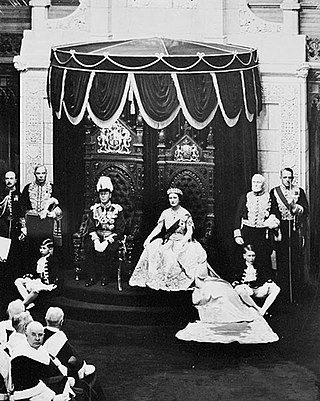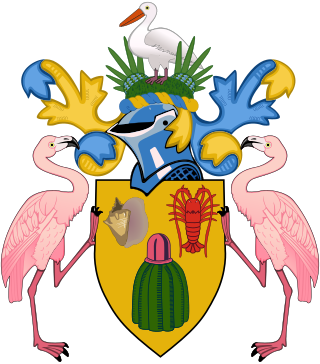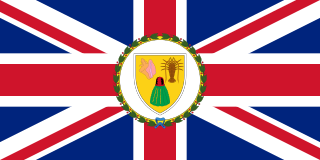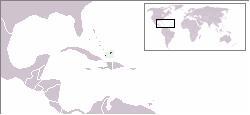 |
|---|
| Constitution |
| Administrative divisions |
The Constitution of the Turks and Caicos Islands, in its present form, was passed in 2011.
 |
|---|
| Constitution |
| Administrative divisions |
The Constitution of the Turks and Caicos Islands, in its present form, was passed in 2011.
When Jamaica became independent in 1962, the Turks and Caicos Islands, formerly under Jamaican administration, became a Crown colony in its own right.[ citation needed ] To this end, an Order in Council was made giving the Turks and Caicos Islands its own constitution appropriate to that status. [1] This was done under the provisions of the West Indies Act 1962. However, as Secretary of State for the Colonies Anthony Greenwood later stated, due to an error the Order (as well as a similar order for the Cayman Islands) was not laid before both Houses of Parliament as required. He stated this did not prevent the orders from coming into effect in 1962, but thought it prudent that they be laid before Parliament as required. [2] The Constitution was then amended twice in 1967 and once each in 1968 and 1969. [3]
A new constitution was passed in 1976. [4] 30 August, the date of its passage, is celebrated as a public holiday, Constitution Day. [5] This constitution was suspended in 1986 in response to allegations of malpractice and criminality among both the Government and the Opposition. [6]
A new constitution was passed in 1988. [7] It was first amended in 1993, [8] and again in 2002. [9] The September 2002 report of the Constitutional Modernisation Review Body which led to those latest amendments is available online. [10]
A new constitution was passed in 2006. [11] It was criticised for giving too much discretion to Cabinet Ministers. [12] The constitution was suspended again in August 2009 when the United Kingdom resumed direct rule over the island in response to allegations of government corruption. [13]
The current constitution was passed in 2011. [14] It makes various changes to the 2006 constitution, such as vesting the Attorney-General's powers over criminal prosecutions in a new Director of Public Prosecutions. [15] It came into force on 15 October 2012. [16]

The Turks and Caicos Islands are a British Overseas Territory consisting of the larger Caicos Islands and smaller Turks Islands, two groups of tropical islands in the Lucayan Archipelago of the Atlantic Ocean and northern West Indies. They are known primarily for tourism and as an offshore financial centre. The resident population in July 2021 was put at 57,196, making it the third-largest of the British overseas territories by population. However, according to a Department of Statistics estimate in 2022, the population was 47,720.

The Parliament Acts 1911 and 1949 are two Acts of the Parliament of the United Kingdom, which form part of the constitution of the United Kingdom. Section 2(2) of the Parliament Act 1949 provides that the two Acts are to be construed as one.

Royal assent is the method by which a monarch formally approves an act of the legislature, either directly or through an official acting on the monarch's behalf. In some jurisdictions, royal assent is equivalent to promulgation, while in others that is a separate step. Under a modern constitutional monarchy, royal assent is considered little more than a formality. Even in nations such as the United Kingdom, Norway, the Netherlands, Liechtenstein and Monaco which still, in theory, permit their monarch to withhold assent to laws, the monarch almost never does so, except in a dire political emergency or on advice of government. While the power to veto by withholding royal assent was once exercised often by European monarchs, such an occurrence has been very rare since the eighteenth century.

The British Overseas Territories (BOTs), also known as the United Kingdom Overseas Territories (UKOTs), are fourteen territories with a constitutional and historical link with the United Kingdom, but do not form part of the United Kingdom itself. The permanently inhabited territories are internally self-governing, with the United Kingdom retaining responsibility for defence and foreign relations. All of the territories are inhabited by civilians, except three that are chiefly or only inhabited by military or scientific personnel. All fourteen have the British monarch as head of state. These UK government responsibilities are assigned to various departments of the Foreign, Commonwealth and Development Office and are subject to change.

Before European colonization, the Turks and Caicos Islands were inhabited by Taíno and Lucayan peoples. The first recorded European sighting of the islands now known as the Turks and Caicos occurred in 1512. In the subsequent centuries, the islands were claimed by several European powers with the British Empire eventually gaining control. For many years the islands were governed indirectly through Bermuda, the Bahamas, and Jamaica. When the Bahamas gained independence in 1973, the islands received their own governor, and have remained a separate autonomous British Overseas Territory since. In August 2009, the United Kingdom suspended the Turks and Caicos Islands' self-government following allegations of ministerial corruption. Home rule was restored in the islands after the November 2012 elections.

Politics of the Turks and Caicos Islands takes place in a framework of a parliamentary representative democratic dependency, whereby as of August 9, 2006 the Premier is the head of government, and of a multi-party system. The islands are an internally self-governing overseas territory of the United Kingdom. The United Nations Committee on Decolonization includes the Turks and Caicos Islands on the United Nations list of non-self-governing territories. Executive power is exercised by the government. Legislative power is vested in both the government and the Legislative Council.

Belonger status is a legal classification normally associated with British Overseas Territories. It refers to people who have close ties to a specific territory, normally by birth or ancestry. The requirements for belonger status, and the rights that it confers, vary from territory to territory.

The governor of the Turks and Caicos Islands is the representative of the British monarch in the United Kingdom's British Overseas Territory of Turks and Caicos Islands. The Governor is appointed by the monarch on the advice of the British government. The role of the governor is to act as the vice-regal representative of the head of state, His Majesty King Charles III. The Governor appoints the Premier and 5 members of the House of Assembly. The official residence of the governor is the Government House of Turks and Caicos Islands, located in Waterloo on the island of Grand Turk.

The House of Assembly is the legislature of the British Overseas Territory of the Turks and Caicos Islands. The name of the house was changed from the Legislative Council of the Turks and Caicos Islands to its present name following the implementation of the new constitution on 9 August 2006.
Citation of United Kingdom legislation includes the systems used for legislation passed by devolved parliaments and assemblies, for secondary legislation, and for prerogative instruments. It is relatively complex both due to the different sources of legislation in the United Kingdom, and because of the different histories of the constituent countries of the United Kingdom.

The Gibraltar Constitution Order 2006 was taken to a referendum in Gibraltar on 30 November 2006. A coalition of groups opposing the proposal held that a majority of 60% should be required to give effect to a new Constitution, quoting other instances, but the political parties held that the result should be decided by a simple majority in favour of the new constitution. The constitution was approved by 60% of the votes anyway.

Lesbian, gay, bisexual, and transgender (LGBT) persons in the British Overseas Territory of the Turks and Caicos Islands face legal challenges not experienced by non-LGBT residents. Same-sex sexual activity has been legal in the Turks and Caicos Islands since 2001, and discrimination based on sexual orientation is constitutionally banned.
A dominion was any of several self-governing nations of the British Empire. With the evolution of the British Empire into the Commonwealth of Nations, the dominions became independent states.
The royal prerogative is a body of customary authority, privilege, and immunity recognized in common law as belonging to the sovereign, and which have become widely vested in the government. It is the means by which some of the executive powers of government, possessed by and vested in a monarch with regard to the process of governance of the state, are carried out.
The Perth Agreement was made in Australia in 2011 by the prime ministers of what were then the sixteen states known as Commonwealth realms, all recognising Elizabeth II as their head of state. The document agreed that the governments of the realms would amend their laws concerning the succession to their shared throne and related matters. The changes, in summary, comprised:
The Attorney-General of the Turks and Caicos Islands is the legal adviser to the Government and House of Assembly of the Turks and Caicos Islands. Previously administered indirectly via Bermuda, Jamaica and the Bahamas, the islands received their own governor and became a separate autonomous British Overseas Territory when Bahamas became independent in 1973.
The Director of Public Prosecutions is an officer of the Government of the Turks and Caicos Islands whose role is to prosecute criminal offences. The role was newly created by the 2011 Constitution.
The Cabinet of the Turks and Caicos Islands comprises the ministers who advise the governor on government affairs. It was known as the Executive Council under the 1988 Constitution, and was given its current name in the 2006 Constitution. The Cabinet was disbanded in 2009 when self-government in the Turks and Caicos Islands was suspended. It was reconstituted after the 2012 election.

The potential annexation of the Turks and Caicos Islands by Canada is a recurring proposal on the future political status of the island territory. The islands are currently a British Overseas Territory under the sovereignty of the United Kingdom.